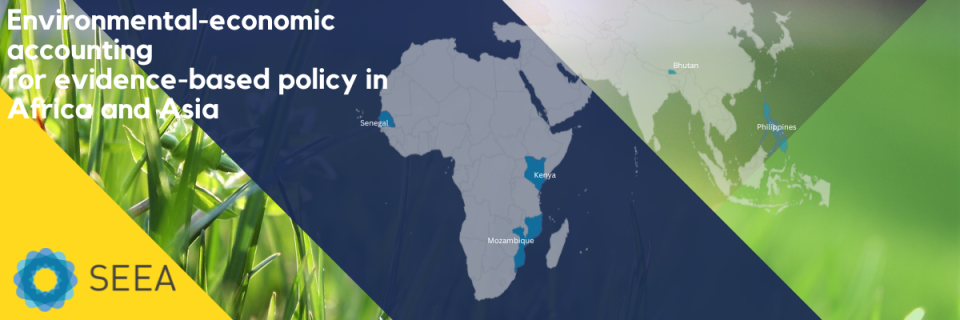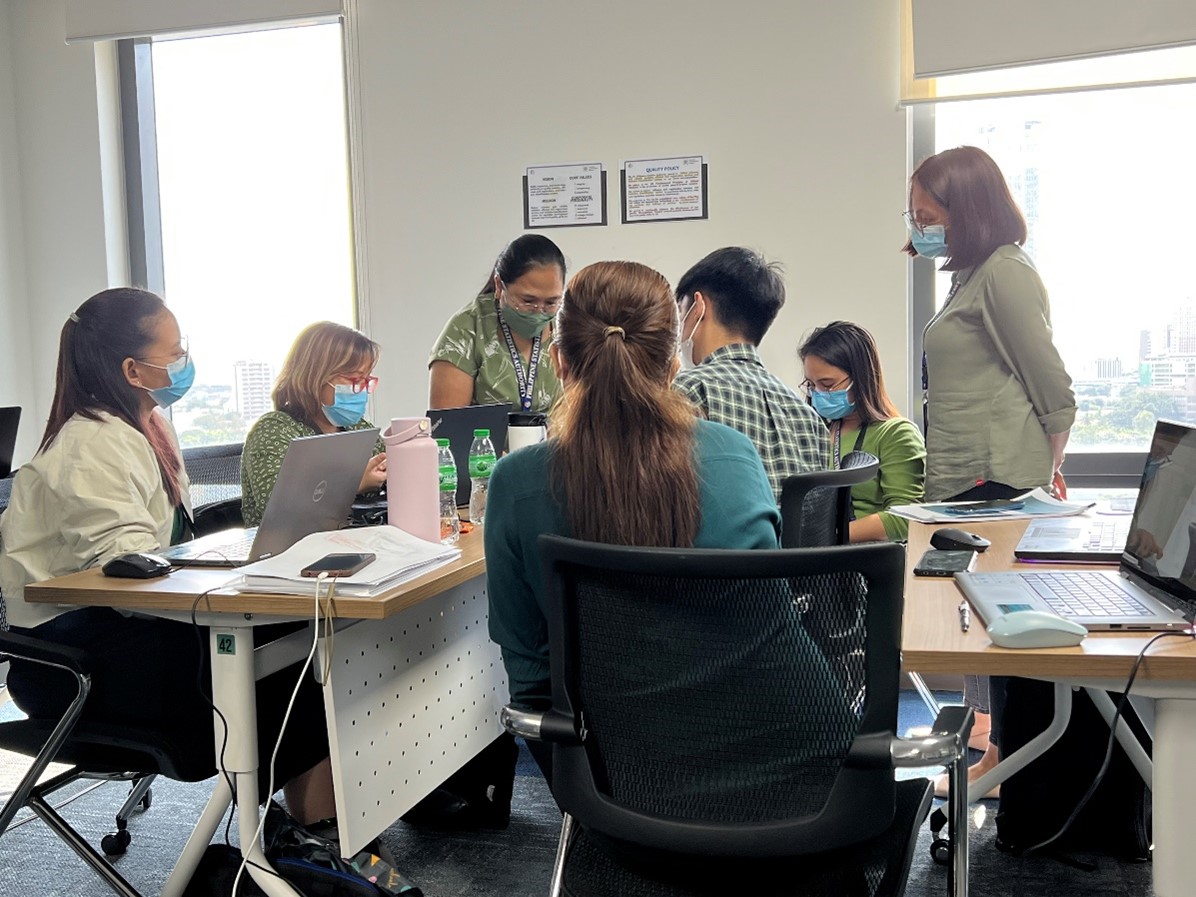UNSD Strengthens Implementation of the SEEA

Recognizing the critical role of integrated environmental and economic information for effective policy and decision-making for sustainable development, a growing number of countries have embraced the implementation of the System of Environmental-Economic Accounting (SEEA) over the past years. To scale up implementation, the United Nations Statistics Division (UNSD) started in 2020 a three-year long project entitled “Environmental-Economic Accounting for Evidence-Based Policy in Africa and Asia” funded under the 12th Tranche of the UN Development Account (UNDA). The project aims to address the technical and institutional barriers to the establishment of routinely produced environmental-economic accounts at the national level by national statistical offices (NSOs) in five countries: Bhutan, Kenya, Mozambique, the Philippines and Senegal.
Taking the implementation guide for the SEEA and the implementation strategy for the SEEA Ecosystem Accounting (SEEA EA) as a basis, the project advocates for a flexible and modular approach to country implementation which is driven by country-specific policy priorities and stakeholder needs. Under the project, countries will develop a national plan that serves as a blueprint for implementation of the SEEA based on the identified policy priorities, as well as a plan on how to use the SEEA in support of the Sustainable Development Goals (SDGs). These national plans are drafted based on consultations with national stakeholders to ensure broad uptake and increased awareness and buy-in. The project also focuses on building technical capacity to complete one or more SEEA accounts. In particular, UNSD will help provide technical assistance and support each NSO to establish a technical committee for the compilation of the selected accounts.
Read more about Bhutan, Kenya, Mozambique, the Philippines and Senegal below.
Bhutan began project activities in June 2022, focusing on energy. The project is jointly implemented by the Bhutan National Statistics Bureau (NSB) and UNSD. The current focus of the project is on physical energy flow accounts and building the institutional and technical capacity of NSB. The NSB currently compiles and disseminates several SEEA accounts, including experimental energy accounts. The UNSD is currently working with NSB to strengthen, improve and expand the experimental energy account as well as explore the development of air emission accounts for Bhutan. Policy application of the accounts is also a focus, and the project will explore the development of indicators from the energy and air emission accounts which can support SDG monitoring and other international initiatives.
Building on the successful implementation of the first energy accounts for Kenya during a preceding project (2015-2017), the Kenya National Bureau of Statistics (KNBS) is developing a National Plan for Advancing Environmental-Economic Accounting in the country and beginning compilation of water accounts.
With input from relevant stakeholders, the National Plan will include an assessment of environmental-economic accounting initiatives, a policy needs analysis and a data assessment. The National Plan will raise awareness of the importance of the SEEA amongst the relevant national agencies, identify priority accounts, and identify financing needs for SEEA implementation in Kenya.
To make progress on water accounts, a national technical committee on water accounts was formed in June, comprising of representatives from KNBS and several line ministries involved in water policy. In addition, from 12 to 16 September, a Joint Workshop on Water Account Compilation and Ecosystem Accounting, organized by the KNBS and UNSD, took place in Nairobi.
 The first half of the workshop aimed to help members of the technical committee make progress on the water account through hands-on training and identification of necessary data items and data sources in Kenya. The training also provided an opportunity to make partnerships between national agencies.
The first half of the workshop aimed to help members of the technical committee make progress on the water account through hands-on training and identification of necessary data items and data sources in Kenya. The training also provided an opportunity to make partnerships between national agencies.
The second half of the workshop focused on ecosystem accounting, and was organized in collaboration with the International Union for Conservation of Nature (IUCN). The workshop introduced participants to the SEEA EA conceptual framework and ARIES for SEEA. Participants also worked to identify priority accounts and ecosystem services, as well as potential data sources and data gaps. The workshop also highlighted the policy applications of ecosystem accounts in the context of Kenya, such as conservation policies, the post-2020 global biodiversity framework, and the Sustainable Development Goals.
It is planned that the National Plan and the water accounts would be published in mid-2023 together with the latest update of the energy accounts.
Mozambique has prioritized the development of energy accounts, the first SEEA account for the country. Within the framework of this project, the National Statistical Institute (Instituto Nacional de Estatística - INE), with the support of UNSD, will build the technical capacity in the national statistical system on the compilation of SEEA accounts.
The co mpilation of the energy account started in June 2022 when a technical committee on energy accounts was formed with representatives from the INE, Ministry of Natural Resources and Energy, Ministry of Land and Environment, Electricity of Mozambique, National Institute of Petroleum, IMOPETRO, and Energy Fund. An online training on energy accounting took place throughout July and August, which consisted of self-paced modules and live webinars on energy accounting in Brazil and Kenya.
mpilation of the energy account started in June 2022 when a technical committee on energy accounts was formed with representatives from the INE, Ministry of Natural Resources and Energy, Ministry of Land and Environment, Electricity of Mozambique, National Institute of Petroleum, IMOPETRO, and Energy Fund. An online training on energy accounting took place throughout July and August, which consisted of self-paced modules and live webinars on energy accounting in Brazil and Kenya.
Most recently, in September 2022, the technical committee met in-person in Maputo during the Energy Accounting Workshop in Maputo. The workshop focused on the methodology and data necessary for compiling energy accounts. It was structured as a hands-on data and compilation workshop, where the participants worked on mapping the national energy sector and flows of the energy resources. The national energy data sources were reviewed, shared between the national agencies and used to develop a conceptual framework for the Mozambique energy accounts. The workshop concluded with a discussion on next steps on how to finalize the energy accounts. It is planned that the pilot energy account, in both physical and monetary terms, will be developed over the following months and published by INE in mid-2023.
The launch of the project in the Philippines took place in August 2021. The project is jointly implemented by the Philippine Statistics Authority (PSA) and UNSD and is focusing on land and ecosystem accounts, as w ell as an action plan for the development and institutionalization of the accounts.
ell as an action plan for the development and institutionalization of the accounts.
The current focus of the project is on compiling land cover accounts, and an in-person workshop was recently held in from 26-30 September 2022 in Manila. The training introduced members of PSA and the National Mapping and Resource Information Authority (NAMRIA) to the SEEA Ecosystem Accounting conceptual framework and provided hands-on training for compiling land accounts. During the training, participants used QGIS to review and prepare land cover data for the accounts and learned how the ARIES for SEEA tool can be used to build upon land cover accounts to create ecosystem accounts. Participants also initiated a geospatial data assessment, with a focus on geospatial data that can be used for the production of ecosystem accounts that are particularly policy-relevant for the Philippines. In addition, participants learned about the uses of land cover accounts for SDG 15: Life on Land.
An action plan has been developed under the project for the time period until 2025 and will soon be released. This action plan contains concrete proposals to strengthen the production and use of the accounts in the Philippines. The action plan was created through several consultations with institutional stakeholders and technical working groups between 2021 and 2022, as well as a desk review. The action plan aims to complement the recent Roadmap to Institutionalize Natural Capital Accounting in the Philippines, which has a longer time horizon of 2022 to 2040.
In Senegal, th e project is being jointly implemented by the National Agency for Statistics and Demography (Agence Nationale de la Statistique et de la Démographie, ANSD) and UNSD, and is focusing on the development of land accounts, ecosystem accounts and a National Plan for Advancement of Environmental-Economic Accounting in Senegal. The project started in May 2021 with a launch meeting, where a technical committee was established consisting of representatives from ANSD, Center for Ecological Monitoring, National Agency for Spatial Planning, Directorate of Water and Forests, Hunting and Soil Conservation, Directorate of Planning and Environmental Monitoring, and Directorate of Water Resources Management and Planning.
e project is being jointly implemented by the National Agency for Statistics and Demography (Agence Nationale de la Statistique et de la Démographie, ANSD) and UNSD, and is focusing on the development of land accounts, ecosystem accounts and a National Plan for Advancement of Environmental-Economic Accounting in Senegal. The project started in May 2021 with a launch meeting, where a technical committee was established consisting of representatives from ANSD, Center for Ecological Monitoring, National Agency for Spatial Planning, Directorate of Water and Forests, Hunting and Soil Conservation, Directorate of Planning and Environmental Monitoring, and Directorate of Water Resources Management and Planning.
The compilation of land accounts started with an in-person workshop in November 2021 in Dakar that aimed to introduce the members of the technical committee to the ARIES for SEEA tool for compilation of land and ecosystem accounts. In particular, the work focused on the land cover account, with the. harmonization of land cover maps and classifications and concluded in July 2022. In parallel, the National Plan is being developed and it is planned to be launched and published in January 2023 together with the land account.
